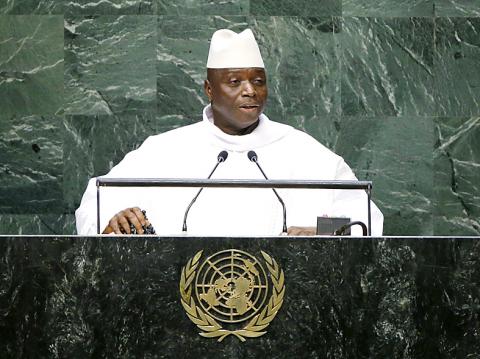The Gambia has announced its withdrawal from the International Criminal Court (ICC), accusing the Hague, Netherlands-based tribunal of the “persecution and humiliation of people of color, especially Africans.”
The announcement late on Tuesday came after similar decisions this month by South Africa and Burundi to abandon the troubled institution, established to try the world’s worst crimes.
Gambian Minister of Information and Communication Infrastructure Sheriff Bojang said in an announcement on state TV that the court had been used “for the persecution of Africans and especially their leaders” while ignoring crimes committed by the West.

Photo: AP
He singled out the case of former British prime minister Tony Blair, who the ICC decided not to indict over the Iraq war.
“There are many Western countries, at least 30, that have committed heinous war crimes against independent sovereign states and their citizens since the creation of the ICC and not a single Western war criminal has been indicted,” Bojang said.
The withdrawal “is warranted by the fact that the ICC, despite being called International Criminal Court, is in fact an International Caucasian Court for the persecution and humiliation of people of color, especially Africans,” he said.
The ICC, established in 2002, is often accused of bias against Africa and has also struggled with a lack of cooperation, including from the US, which has signed the court’s treaty, but never ratified it.
The Gambia has been trying without success to use the court to punish the EU for deaths of thousands of African refugees trying to reach its shores.
The decision will also come as a personal blow to the court’s chief prosecutor, Fatou Bensouda, a former Gambian justice minister.
The court over the weekend asked South Africa and Burundi to reconsider their decisions to leave, which came as a major blow to the institution.
“I urge them to work together with other states in the fight against impunity, which often causes massive violations of human rights,” Assembly of States Parties to the Rome Statute of the ICC president Sidiki Kaba said in a statement.
South Africa’s decision followed a dispute last year when Sudanese President Omar al-Bashir visited the country, despite being the subject of an ICC arrest warrant over alleged war crimes.
Earlier this month, Burundi said it would leave the court, while Namibia and Kenya have also raised the possibility.
Kaba said he was concerned that South Africa and Burundi’s decisions would pave the way for other African states to leave the court.

POLITICAL PRISONERS VS DEPORTEES: Venezuela’s prosecutor’s office slammed the call by El Salvador’s leader, accusing him of crimes against humanity Salvadoran President Nayib Bukele on Sunday proposed carrying out a prisoner swap with Venezuela, suggesting he would exchange Venezuelan deportees from the US his government has kept imprisoned for what he called “political prisoners” in Venezuela. In a post on X, directed at Venezuelan President Nicolas Maduro, Bukele listed off a number of family members of high-level opposition figures in Venezuela, journalists and activists detained during the South American government’s electoral crackdown last year. “The only reason they are imprisoned is for having opposed you and your electoral fraud,” he wrote to Maduro. “However, I want to propose a humanitarian agreement that

ECONOMIC WORRIES: The ruling PAP faces voters amid concerns that the city-state faces the possibility of a recession and job losses amid Washington’s tariffs Singapore yesterday finalized contestants for its general election on Saturday next week, with the ruling People’s Action Party (PAP) fielding 32 new candidates in the biggest refresh of the party that has ruled the city-state since independence in 1965. The move follows a pledge by Singaporean Prime Minister Lawrence Wong (黃循財), who took office last year and assumed the PAP leadership, to “bring in new blood, new ideas and new energy” to steer the country of 6 million people. His latest shake-up beats that of predecessors Lee Hsien Loong (李顯龍) and Goh Chok Tong (吳作棟), who replaced 24 and 11 politicians respectively

Young women standing idly around a park in Tokyo’s west suggest that a giant statue of Godzilla is not the only attraction for a record number of foreign tourists. Their faces lit by the cold glow of their phones, the women lining Okubo Park are evidence that sex tourism has developed as a dark flipside to the bustling Kabukicho nightlife district. Increasing numbers of foreign men are flocking to the area after seeing videos on social media. One of the women said that the area near Kabukicho, where Godzilla rumbles and belches smoke atop a cinema, has become a “real

‘POINT OF NO RETURN’: The Caribbean nation needs increased international funding and support for a multinational force to help police tackle expanding gang violence The top UN official in Haiti on Monday sounded an alarm to the UN Security Council that escalating gang violence is liable to lead the Caribbean nation to “a point of no return.” Special Representative of the UN Secretary-General for Haiti Maria Isabel Salvador said that “Haiti could face total chaos” without increased funding and support for the operation of the Kenya-led multinational force helping Haiti’s police to tackle the gangs’ expanding violence into areas beyond the capital, Port-Au-Prince. Most recently, gangs seized the city of Mirebalais in central Haiti, and during the attack more than 500 prisoners were freed, she said.